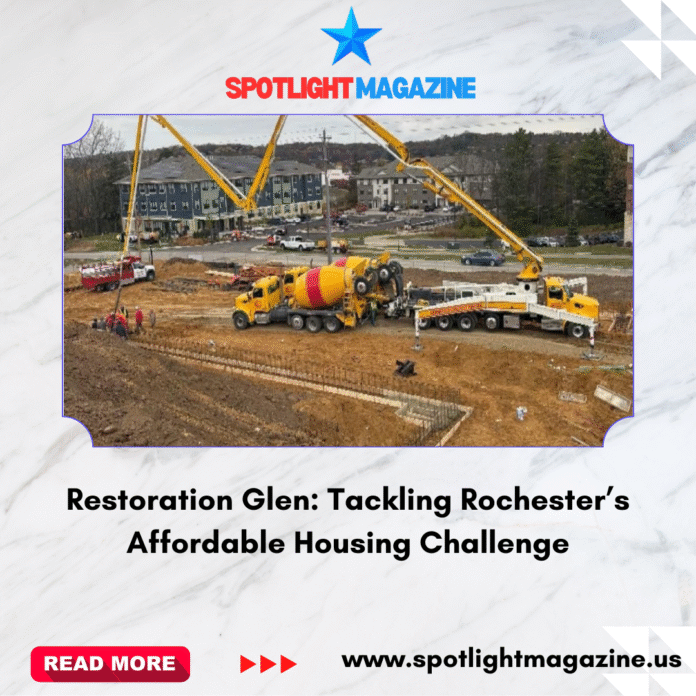Building affordable housing is far from cheap, as Jeff Urban, executive director of Bear Creek Development, points out. The Rochester nonprofit, in partnership with Three Rivers Community Action, has begun constructing a 48-unit apartment building called Restoration Glen along Mayowood Road. The three-story building will provide at least seven units for people who have experienced homelessness and five for individuals with disabilities, with the remaining units available at affordable rents based on income.
The total project cost is estimated at nearly $23.7 million, with the construction contract alone accounting for almost $18 million, or roughly 70% to 75% of the budget. That comes out to about $495,000 per unit—much higher than the roughly $350,000 per unit typical of market-rate developments. Urban says the difference is largely due to the restrictions and negotiations required when using tax credits and other funding sources tied to affordable housing.
The project took nearly two years to coordinate because it relies on multiple funding sources, including state and federal tax credits, private grants, and a federal loan through the HOME Investment Partnerships Program. Chris Flood, housing development officer for Three Rivers Community Action, explains that when projects depend on several sources, each with its own rules and restrictions, all funding must align before the bulk of state and federal money is released. This often causes delays compared to projects like Olmsted County’s nearby Trailside Apartments, which relied mostly on a single state source and could start earlier.
The complex funding process added $100,000 in legal fees to the Restoration Glen project, and changes in legislation and federal rules over the past two years further complicated matters. Inflation also pushed costs higher. Flood notes that while market-rate developers can access more flexible financing, nonprofits building affordable housing face added risks and expenses because funding sources limit future rents.
Reports of fraud related to state services have also slowed approvals. Laura Helle, housing and homeownership director at Three Rivers Community Action, says agencies tend to tighten rules whenever issues arise, slowing the process even further. Despite these challenges, Helle and Urban say the effort is worth it. They plan to pursue future projects, like Trotter Haven, which also received state support last year.
While buying and renovating existing buildings might seem more efficient, Helle explains that the current housing shortage makes that approach difficult. Building new affordable units ensures long-term availability, with Restoration Glen designed to serve the community for the next 50 years. Urban acknowledges that state-supported projects, which average two per year in Olmsted County, are only a small part of addressing the region’s housing needs. He emphasizes the importance of finding creative local solutions to supplement state support and build more affordable housing.


